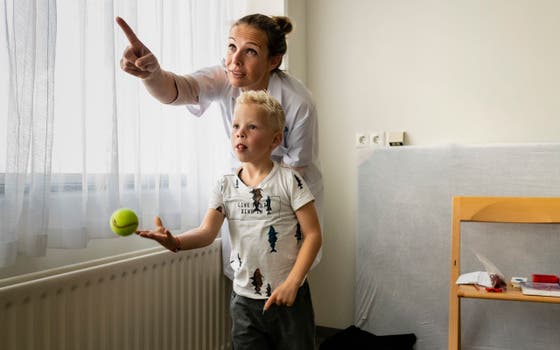Symposium: If moving is a concern

Lees artikel in het Nederlands >
Young children with severe congenital heart defects have an increased risk of developing brain damage due to delayed brain development. As a result, long-term developmental problems frequently occur.
In the early years, this is particularly noticeable in gross motor skills. For example, a child starts crawling and walking later. Later in life, problems in fine motor skills are more prominent, for instance in writing, drawing and cutting. Exercise is very important for these children, even if it is sometimes exciting for parents.
The Children's Movement Centre is organising a symposium for healthcare professionals on the theme "When exercise is a concern" on the 26th and 27th of January. The focus is on the development of the young child at high risk of developmental problems. Day 1 will focus on the young child with neurological damage and on day 2 will partially deal with the young child with congenital heart defect.
Co-organiser and paediatric physiotherapist Maaike Sprong works within the Hart op Weg poli (WKZ) with various specialists, such as neonatologists, paediatric cardiologists, psychologists, exercise physiologists. Maaike says: "The children who come to the Heart on the Way outpatient clinic have been at home in the WKZ from an early age. They come for regular check-ups. Apart from heart checks (with an ultrasound, ECG or MRI), at the Hart op Weg outpatient clinic we also monitor their development and physical functioning with developmental examinations and exercise tests." Maaike explains: "If motor development or fitness is impaired, child physiotherapy support can be initiated, for example, to stimulate the child's development or improve their fitness." Involving parents in this is also very important. "If, later in life, an exercise test shows that a child's capacity is lower than normal, healthcare providers can find out the limiting factor, give exercise advice or adjust treatment.
Minimise the difference with peers
WKZ is an academic hospital, where a lot of scientific research is carried out in addition to childcare. Recent studies show that motor development sometimes stagnates in children with a congenital heart defect. In the early years, this is noticeable in gross motor skills, for example when crawling and walking or not keeping up with gymnastics or playing outside. Later in life, we see more problems with fine motor skills, which can lead to difficulties with writing and learning. "When early developmental screening shows developmental delays, we can provide extra help to minimise the difference with peers," says Maaike.
Optimising the endurance of children with congenital heart defects is also important for their future health. Maaike: "We know that young adults with a congenital heart defect have an increased risk of obesity and cardiovascular disease if they have been less active in childhood. That's why it's so important for these children to exercise and to experience sports as fun as other children."
How can we best support children and their parents in their daily life and during sports and games? Maaike: "Parents of children with congenital diseases regularly see their child as vulnerable and are therefore concerned about the risk of (heavy) exercise or sport. Research shows that more than 80 per cent of these children do not exercise moderately to intensively for 60 minutes daily, as advised in the Dutch exercise guideline. This is linked to parents' cautious approach. We base our approach to improve patient care on scientific research from the past 12 years. We now follow over 500 patients in their development. We share our experiences with parents and other stakeholders, such as other healthcare providers. It is important that parents feel understood and heard and that they receive appropriate advice. If they know what to expect, it helps them to guide their child to grow up as normally as possible."
